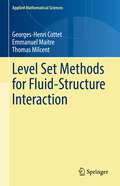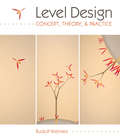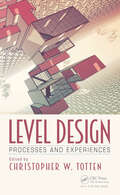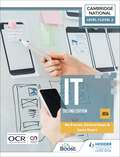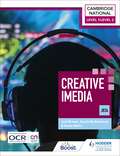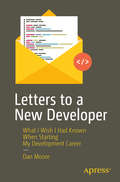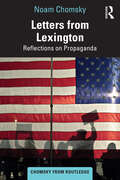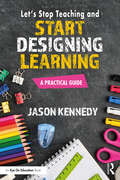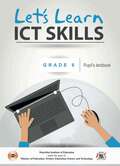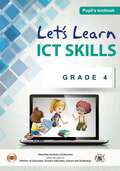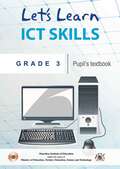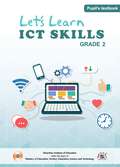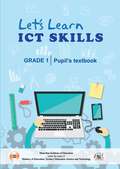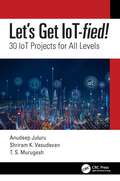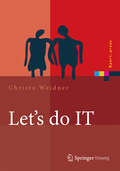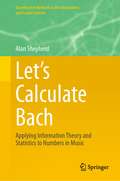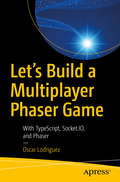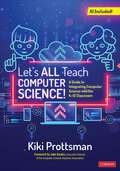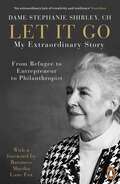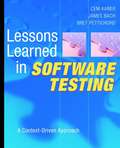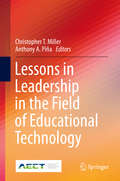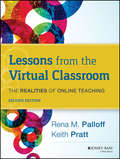- Table View
- List View
Level Set Methods for Fluid-Structure Interaction (Applied Mathematical Sciences #210)
by Georges-Henri Cottet Emmanuel Maitre Thomas MilcentThis monograph is devoted to Eulerian models for fluid-structure interaction by applying the original point of view of level set methods.In the last 15 years, Eulerian models have become popular tools for studying fluid-structure interaction problems. One major advantage compared to more conventional methods such as ALE methods is that they allow the use of a single grid and a single discretization method for the different media. Level set methods in addition provide a general framework to follow the fluid-solid interfaces, to represent the elastic stresses of solids, and to model the contact forces between solids.This book offers a combination of mathematical modeling, aspects of numerical analysis, elementary codes and numerical illustrations, providing the reader with insights into the applications and performance of these models.Assuming background at the level of a Master’s degree, Level Set Methods for Fluid-Structure Interaction provides researchers in the fields of numerical analysis of PDEs, theoretical and computational mechanics with a basic reference on the topic. Its pedagogical style and organization make it particularly suitable for graduate students and young researchers.
Level Design: Concept, Theory, and Practice
by Rudolf KremersGood or bad level design can make or break any game, so it is surprising how little reference material exists for level designers. Beginning level designers have a limited understanding of the tools and techniques they can use to achieve their goals, or even define them. This book is the first to use a conceptual and theoretical foundation to build
Level Design: Processes and Experiences
by Christopher W. TottenIn this book, veteran game developers, academics, journalists, and others provide their processes and experiences with level design. Each provides a unique perspective representing multiple steps of the process for interacting with and creating game levels – experiencing levels, designing levels, constructing levels, and testing levels. These diverse perspectives offer readers a window into the thought processes that result in memorable open game worlds, chilling horror environments, computer-generated levels, evocative soundscapes, and many other types of gamespaces. This collection invites readers into the minds of professional designers as they work and provides evergreen topics on level design and game criticism to inspire both new and veteran designers. Key Features: Learn about the processes of experienced developers and level designers in their own words Discover best-practices for creating levels for persuasive play and designing collaboratively Offers analysis methods for better understanding game worlds and how they function in response to gameplay Find your own preferred method of level design by learning the processes of multiple industry veterans
Level 1/Level 2 Cambridge National in IT (J836): Second Edition
by Maureen Everett Sonia Stuart Richard HoweTrust highly experienced teachers and authors Mo Everett, Richard Howe and Sonia Stuart to guide learners through the redeveloped Level 1/ Level 2 Cambridge National in IT (J836). This thorough and accessibleintroduction to the IT industry will develop your learners' understanding of the core examined content and boost the skills required to tackle the NEA with confidence. This revised and updated textbook is:- Comprehensive. Gain in-depth knowledge of the examined unit with clear explanations of every concept and topic, and develop the skills and understanding for the practical non-examined units, both of which are covered in detail.- Accessible, reliable and trusted. Structured to match the specification and provide the information required to build knowledge, understanding and skills across accessible and easy-to-use chapters and learning features.- Designed to support you. Boost confidence when preparing for assessment with plenty of activities and practice questions.- Your go-to guide. Expert authors have carefully designed tasks and activities to build your skills and aid progression, and written questions to assess your understanding.
Level 1/Level 2 Cambridge National in IT (J836): Second Edition
by Maureen Everett Sonia Stuart Richard HoweTrust highly experienced teachers and authors Mo Everett, Richard Howe and Sonia Stuart to guide learners through the redeveloped Level 1/ Level 2 Cambridge National in IT (J836). This thorough and accessibleintroduction to the IT industry will develop your learners' understanding of the core examined content and boost the skills required to tackle the NEA with confidence. This revised and updated textbook is:- Comprehensive. Gain in-depth knowledge of the examined unit with clear explanations of every concept and topic, and develop the skills and understanding for the practical non-examined units, both of which are covered in detail.- Accessible, reliable and trusted. Structured to match the specification and provide the information required to build knowledge, understanding and skills across accessible and easy-to-use chapters and learning features.- Designed to support you. Boost confidence when preparing for assessment with plenty of activities and practice questions.- Your go-to guide. Expert authors have carefully designed tasks and activities to build your skills and aid progression, and written questions to assess your understanding.
Level 1/Level 2 Cambridge National in Creative iMedia (J834)
by Kevin Wells Sarah McAtominey Judi BrownTrust highly experienced teachers and authors Judi Brown, Sarah McAtominey and Kevin Wells to guide learners through the redeveloped Level 1/Level 2 Cambridge National in Creative iMedia (J834). This thorough, accessible and OCR-endorsed introduction to the Creative iMedia industry will develop your learners' understanding of the core examined content and boost the skills required to tackle the NEA with confidence.This OCR-endorsed textbook is: - Comprehensive. Gain in-depth knowledge of the examined unit with clear explanations of every concept and topic, and develop the skills and understanding for the practical non-examined units, each of which is covered in detail.- Accessible, reliable and trusted. Structured to match the specification and provide the information required to build knowledge, understanding and skills across accessible and easy-to-use chapters and learning features.- Designed to support you. Boost confidence when preparing for assessment with plenty of activities and practice questions.- Your go-to guide. Expert authors have carefully designed tasks and activities to build your skills and aid progression, and written questions to assess your understanding.
Letters to a New Developer: What I Wish I Had Known When Starting My Development Career
by Dan MooreLearn what you need to succeed as a developer beyond the code. The lessons in this book will supercharge your career by sharing lessons and mistakes from real developers. Wouldn’t it be nice to learn from others’ career mistakes? “Soft” skills are crucial to success, but are haphazardly picked up on the job or, worse, never learned. Understanding these competencies and how to improve them will make you a more effective team member and a more attractive hire.This book will teach you the key skills you need, including how to ask questions, how and when to use common tools, and how to interact with other team members. Each will be presented in context and from multiple perspectives so you’ll be able to integrate them and apply them to your own career quickly.What You'll LearnKnow when the best code is no codeUnderstand what to do in the first month of your jobSee the surprising number of developers who can’t programAvoid the pitfalls of working aloneWho This Book Is For Anyone who is curious about software development as a career choice. You have zero to five years of software development experience and want to learn non-technical skills that can help your career. It is also suitable for teachers and mentors who want to provide guidance to their students and/or mentees.
Letters from Lexington: Reflections on Propaganda (Chomsky from Routledge)
by Noam ChomskyUpon its original publication in 1993, Letters from Lexington reaffirmed Noam Chomsky's status as one of the most incisive critics of the American media. Reissued with a new foreword by Chomsky’s long-term collaborator, radio broadcaster David Barsamian, this prescient book remains startlingly relevant in our current age of disinformation and “fake news.”Throughout the book, Chomsky critiques the media’s complicity in US domestic and foreign policy. In particular, Chomsky's analyses of the politics of the Reagan and earlier Bush administrations offer illuminating perspectives on the events, key players, and policies that would continue to shape America's national agenda during the presidency of George W. Bush and the “War on Terrorism.”Letters from Lexington remains an indispensable guide to the American propaganda machine and the shibboleths of the mainstream media. As such, this book will appeal to students and scholars with an interest in the media and US domestic and foreign policy, as well as serve as a vital tool for activists and general readers seeking to question dubious narratives put forward by the mainstream media.
Let's Stop Teaching and Start Designing Learning: A Practical Guide
by Jason KennedyHow can you shift from a focus on content to the creation of active learning experiences? In this practical resource, author Jason Kennedy provides a blueprint to help you stop "teaching" and start designing learning, so you can improve students’ critical thinking, decision making, problem solving, and collaboration with others, preparing them for their futures beyond school doors. The framework for learning design covers components of planning (learning targets), of instruction (the opening, learning task, skills, tools, and success criteria), and of the work session (choices, pathways, feedback, and assessment). Appropriate for teachers of any subject area, the book also offers wide variety of tools to help you implement the ideas in your own setting.
Let’s Learn ICT Skills - Pupil’s Textbook class 6 - MIE
by Mauritius Institute of EducationThis Grade 6 ICT skills textbook comprehensively covers fundamental aspects of computer literacy. Beginning with Computer Fundamentals, it delves into hardware, software, and introduces various operating systems for computers and mobile devices. The Word Processing section advances students' skills, encompassing tasks like adding picture borders, utilizing spelling and grammar tools, and employing find and replace functions. Multimedia skills are honed through the creation and editing of drawings, movies, and presentations, integrating diverse media elements. The Presentation module guides students in editing slides, inserting media, and incorporating animations and hyperlinks. The Spreadsheet segment demonstrates advanced features, including data manipulation, formatting, and chart representation. The Internet section introduces email basics, covering composition, sending, replying, forwarding, and file attachments, while highlighting the advantages of email usage. Overall, the textbook provides a comprehensive foundation for Grade 6 pupils in mastering diverse ICT skills essential for today's digital world.
Let's Learn ICT Skills - Pupil's Book - class 5 - MIE
by Mauritius Institute of EducationThe Grade 5 ICT skills textbook, released by the Mauritius Institute of Education in 2021, serves as a comprehensive guide for students, covering fundamental topics in computer literacy. The curriculum spans computer fundamentals, word processing, multimedia, presentation, spreadsheet, and internet skills. It provides in-depth insights into desktop elements and customization options, emphasizing efficient navigation through right-click menus and keyboard shortcuts. The word processing section focuses on Microsoft Office Word, offering practical demonstrations on inserting clip art, manipulating text, and incorporating tables. The multimedia chapter introduces graphics software using Paint.net, distinguishing between bitmap and vector graphics. The presentation unit utilizes Microsoft Office PowerPoint to teach advanced features such as layout changes, table insertion, and slide transitions. The spreadsheet module, employing Microsoft Office Excel, guides students through data manipulation, including worksheet management, cell formatting, and formula usage. The Internet section utilizes Firefox to instruct students on web browsing, tab management, and basic webpage interactions. With a hands-on approach and practical examples, this textbook aims to equip Grade 5 students with essential ICT skills for effective digital literacy.
Let’s Learn ICT Skills - Pupil’s Book - class 4 - MIE
by Mauritius Institute of EducationThe Grade 4 ICT skills textbook, authored by the academic staff of the Mauritius Institute of Education, provides a comprehensive and accessible guide for students. The book covers essential topics such as computer operations, multimedia, word processing, presentation, spreadsheet, and Internet skills. Divided into units, the curriculum introduces students to the fundamentals of computer usage, including mouse and keyboard skills, desktop navigation, and window manipulation. It progresses to cover multimedia applications and practical exercises using software like Paint. The textbook further delves into word processing with Microsoft Word, file management, presentation creation with PowerPoint, and spreadsheet usage with Excel. The Internet unit introduces basic concepts and skills, guiding students on web browsing and online information retrieval. Each unit offers engaging activities, exercises, and teacher's notes, making the learning experience interactive and enjoyable for Grade 4 students.
Let's Learn ICT Skills - Pupil's Book class 3 - MIE
by Mauritius Institute of EducationThe Computer Fundamentals module provides a comprehensive introduction to the world of computing, covering essential concepts and practical skills. It begins with an overview of computers and their types, such as desktops, laptops, and tablets, along with the fundamental components comprising them. Learners explore file management techniques, spreadsheet basics, and word processing tasks, including document formatting and clip art insertion. Presentation skills are developed through creating PowerPoint slideshows. Internet usage dos and don'ts, web addresses, webpage access, saving, and printing are explained, while multimedia tasks in MS Paint are covered. Furthermore, the module emphasizes health, safety, and ethical considerations related to computer usage, highlighting potential health issues like neck and back pain, and eye strain. By encompassing both theoretical knowledge and practical skills, the module equips learners with a solid foundation in computer literacy essential for modern-day endeavors.
Let's Learn ICT Skills - Pupil's Book class 2 - MIE
by Mauritius Institute of EducationThe ICT Skills Guide by the Mauritius Institute of Education serves as an invaluable resource for educators, aligning with the National Curriculum Framework. It comprehensively covers essential computer literacy topics such as safety measures, software proficiency, and fundamental internet usage. Each unit within the guide delineates clear learning objectives and offers a balanced blend of theoretical concepts and hands-on activities, complemented by corresponding content in the accompanying textbook. With built-in evaluations, educators can effectively gauge student comprehension and progress. This guide proves instrumental in fostering robust ICT competencies among learners, providing a cohesive and structured approach to skill development within the educational framework.
Let's Learn ICT Skills - Pupil's Book class 1 - MIE
by Mauritius Institute of EducationThe ICT skills textbook, developed by the Mauritius Institute of Education in 2021, serves as a foundational guide for students to grasp essential computer competencies. Covering fundamental topics including the structure of a computer system, mouse proficiency, word processing, internet navigation, and multimedia tool utilization, the textbook facilitates a well-rounded understanding of ICT concepts. Through a series of engaging activities and assessments, students are encouraged to identify computer components, practice mouse manipulation, typing, and effectively navigate online platforms. Supported by comprehensive resources such as teachers' manuals and practical exercises, the textbook aligns with the National Curriculum Framework for Nine Year Continuous Basic Education, ensuring a structured and holistic approach to ICT education.
Let's Get IoT-fied!: 30 IoT Projects for All Levels
by Anudeep Juluru Shriram K. Vasudevan T.S. MurugeshInternet of Things (IoT) stands acclaimed as a widespread area of research and has definitely enticed the interests of almost the entire globe. IoT appears to be the present as well as the future technology. This book attempts to inspire readers to explore and become accustomed to IoT. Presented in a lucid and eloquent way, this book adopts a clear and crisp approach to impart the basics as expeditiously as possible. It kicks off with the very fundamentals and then seamlessly advances in such a way that the step-by-step unique approach, connection layout, and the verified codes provided for every project can enhance the intuitive learning process and will get you onboard to the world of product building. We can assure that you will be definitely raring to start developing your own IoT solutions and to get yourself completely lost in the charm of IoT. Let’s start connecting the unconnected! It’s time to get IoT-fied.
Let's do IT: Business-IT-Alignment im Dialog erreichen
by Christa WeidnerWertvolles Potenzial der IT bleibt zu Lasten des ROI in vielen Unternehmen ungenutzt. Doch sicherlich ist die Tatsache, dass die strategisch wichtige Unterstützung für das Business sich nicht voll entfalten kann, noch viel höher zu bewerten, da Marktanteile verloren oder gar nicht erst gewonnen werden. Der vorgestellte Ansatz geht davon aus, dass alles erforderliche Wissen für die beste Lösung bereits in der Organisation vorhanden ist. Dieser meist unentdeckte Schatz des kollektiven Wissens muss nur gehoben werden. Mithilfe von speziellen Methoden wird das kollektive Wissen aufgespürt, um so eine umfassende Liste mit Überlegungen, Anregungen, Konzepten oder Lösungen zu erhalten. Stakeholdermanagement und Change Management sind dabei inklusive. Der Ansatz verspricht, Wertschöpfung und Effizienzsteigerung durch die Einbindung und Motivation der Betroffenen. Die Projekte gewinnen an Planbarkeit und Risiken werden reduziert. Das Projektergebnis entspricht den Anforderungen und unterstützt das Business in optimaler Art und Weise.
Let’s Calculate Bach: Applying Information Theory and Statistics to Numbers in Music (Quantitative Methods in the Humanities and Social Sciences)
by Alan ShepherdThis book shows how information theory, probability, statistics, mathematics and personal computers can be applied to the exploration of numbers and proportions in music. It brings the methods of scientific and quantitative thinking to questions like: What are the ways of encoding a message in music and how can we be sure of the correct decoding? How do claims of names hidden in the notes of a score stand up to scientific analysis? How many ways are there of obtaining proportions and are they due to chance?After thoroughly exploring the ways of encoding information in music, the ambiguities of numerical alphabets and the words to be found “hidden” in a score, the book presents a novel way of exploring the proportions in a composition with a purpose-built computer program and gives example results from the application of the techniques. These include information theory, combinatorics, probability, hypothesis testing, Monte Carlo simulation and Bayesian networks, presented in an easily understandable form including their development from ancient history through the life and times of J. S. Bach, making connections between science, philosophy, art, architecture, particle physics, calculating machines and artificial intelligence. For the practitioner the book points out the pitfalls of various psychological fallacies and biases and includes succinct points of guidance for anyone involved in this type of research.This book will be useful to anyone who intends to use a scientific approach to the humanities, particularly music, and will appeal to anyone who is interested in the intersection between the arts and science.With a foreword by Ruth Tatlow (Uppsala University), award winning author of Bach’s Numbers: Compositional Proportion and Significance and Bach and the Riddle of the Number Alphabet.“With this study Alan Shepherd opens a much-needed examination of the wide range of mathematical claims that have been made about J. S. Bach's music, offering both tools and methodological cautions with the potential to help clarify old problems.” Daniel R. Melamed, Professor of Music in Musicology, Indiana University
Let’s Build a Multiplayer Phaser Game: With TypeScript, Socket.IO, and Phaser
by Oscar LodriguezCreate a fully working multiplayer game from scratch using TypeScript, Socket.IO, and the community edition of Phaser.js. You will achieve amazing feats in the browser without having to install any software. This book teaches you how to use the Phaser game engine APIs to tap into physics, and how to utilize HUD information and fire lasers.Let’s Build a Multiplayer Phaser Game dives into the details to show you how to create a multiplayer game from beginning to end. Once you have finished this book, you will be well versed in creating not only a game, but also an application that you can extend with new functionality to enjoy with your friends.What You'll LearnDiscover the ins and outs of Socket.IO for real-time web communicationUse TypeScript to allow your project to be typed and self-documentingSee how gaming mechanics work to make a game entertainingGet a deeper understanding of how to structure your working directory and your codeScale what you have createdWho This Book Is ForDevelopers who want to know how to create and structure a complex online game
Let′s All Teach Computer Science!: A Guide to Integrating Computer Science Into the K-12 Classroom
by Kiki ProttsmanYou belong in this world of computer science education—and because of you, adults of the future will understand how to responsibly participate in high-tech environments with confidence. Districts, cities, and states are moving toward computer science requirements for all K-12 classrooms, even in courses that were not previously associated with technology. These new requirements leave many teachers feeling anxious and unprepared when it comes to integrating computer science into existing curriculum. This book is here to support educators in that shift by inviting them to explore computer science and coding in an approachable and unintimidating way. Let′s All Teach Computer Science: K-12 is a source of inspiration and empowerment for educators who are moving into this technological wonderland. Kiki Prottsman has more than 15 years of experience in computer science education, and her insight informs thoughtful discussions on promoting creativity, problem-solving, and collaboration in students. The book positions computer science in a way that supports other essential skills–such as reading, writing, and mathematics– by providing customizable frameworks that help to seamlessly integrate computer science into core subjects. This book: Provides powerful insights for creating innovative and inclusive learning environments Offers practical examples of integrating computer science into traditional subjects like math, history, art, and more Highlights the importance of addressing implicit biases and promoting computer science as an inclusive field for all students Includes insights on classroom technology and educational technology, as well as AI and its role in education Encourages educators to work together to nurture digital innovators while recognizing potential challenges and frustrations Let′s All Teach Computer Science is an essential guide that equips K-12 teachers with the knowledge and tools necessary to begin teaching computer science immediately–and does so in an enjoyable way, thanks to Prottsman’s friendly and playful style.
Let′s All Teach Computer Science!: A Guide to Integrating Computer Science Into the K-12 Classroom
by Kiki ProttsmanYou belong in this world of computer science education—and because of you, adults of the future will understand how to responsibly participate in high-tech environments with confidence. Districts, cities, and states are moving toward computer science requirements for all K-12 classrooms, even in courses that were not previously associated with technology. These new requirements leave many teachers feeling anxious and unprepared when it comes to integrating computer science into existing curriculum. This book is here to support educators in that shift by inviting them to explore computer science and coding in an approachable and unintimidating way. Let′s All Teach Computer Science: K-12 is a source of inspiration and empowerment for educators who are moving into this technological wonderland. Kiki Prottsman has more than 15 years of experience in computer science education, and her insight informs thoughtful discussions on promoting creativity, problem-solving, and collaboration in students. The book positions computer science in a way that supports other essential skills–such as reading, writing, and mathematics– by providing customizable frameworks that help to seamlessly integrate computer science into core subjects. This book: Provides powerful insights for creating innovative and inclusive learning environments Offers practical examples of integrating computer science into traditional subjects like math, history, art, and more Highlights the importance of addressing implicit biases and promoting computer science as an inclusive field for all students Includes insights on classroom technology and educational technology, as well as AI and its role in education Encourages educators to work together to nurture digital innovators while recognizing potential challenges and frustrations Let′s All Teach Computer Science is an essential guide that equips K-12 teachers with the knowledge and tools necessary to begin teaching computer science immediately–and does so in an enjoyable way, thanks to Prottsman’s friendly and playful style.
Let It Go: My Extraordinary Story - From Refugee to Entrepreneur to Philanthropist
by Dame Stephanie Shirley CH Richard AskwithA moving memoir from a woman who made a fortune in a man's world and then gave it all away...soon to be turned into a filmIn 1962, Stephanie 'Steve' Shirley created a software company when the concept of software barely existed. Freelance Programmers employed women to work on complex projects such as Concorde's black box recorder from the comfort of their own home. Shirley empowered a generation of women in technology, giving them unheard of freedom to choose their own hours and manage their own workloads. The business thrived and Shirley gradually transferred ownership to her staff, creating 70 millionaires in the process.Let It Go explores Shirley's trail blazing career as an entrepreneur but it also charts her incredible personal story - her dramatic arrival in England as an unaccompanied Kindertransport refugee during World War Two and the tragic loss of her only child who suffered severely from Autism.Today, Dame Stephanie Shirley is one of Britain's leading philanthropists, devoting most of her time, energy and wealth to charities that are close to her heart. In Let It Go, Shirley tells her inspirational story and explains why giving her wealth away - letting it go - has brought her infinitely more happiness and fulfilment than acquiring it in the first place.Co-written with Richard Askwith, the former Executive Editor of The Independent and the award-winning author of seven books in his own name, including biographies of Emil Zátopek and Lata Brandisová.'An extraordinary tale of creativity and resilience' - Guardian'This engrossing story of an extraordinary life is filled with lessons in what it means to be human' - Financial Times
Lessons Learned in Software Testing
by Cem Kaner James Bach Bret PettichordDecades of software testing experience condensed into the most important lessons learned. The world's leading software testing experts lend you their wisdom and years of experience to help you avoid the most common mistakes in testing software. Each lesson is an assertion related to software testing, followed by an explanation or example that shows you the how, when, and why of the testing lesson. More than just tips, tricks, and pitfalls to avoid, Lessons Learned in Software Testing speeds you through the critical testing phase of the software development project without the extensive trial and error it normally takes to do so. The ultimate resource for software testers and developers at every level of expertise, this guidebook features: * Over 200 lessons gleaned from over 30 years of combined testing experience * Tips, tricks, and common pitfalls to avoid by simply reading the book rather than finding out the hard way * Lessons for all key topic areas, including test design, test management, testing strategies, and bug reporting * Explanations and examples of each testing trouble spot help illustrate each lesson's assertion
Lessons in Leadership in the Field of Educational Technology
by Anthony A. Piña Christopher T. MillerThe idea for this edited book came about due to the increased discussion and focus on leadership within the educational technology field and particularly in the Association for Educational Communications and Technology organization. There is a diverse amount of individuals in leadership in the field that contributed their lessons learned. This book focuses on sharing the lessons learned by leaders in the field on how they became a leader and what leadership means. The primary contributions address three central questions. What is your story about how you became a leader? What lessons have you learned about being an effective leader? What advice would you give others to become a leader? In addition, this book spotlights the impact that past leaders have had on current leaders and upon the field of educational technology.
Lessons from the Virtual Classroom
by Rena M. Palloff Keith PrattRena Palloff and Keith Pratt, the most trusted online teaching experts, have completely updated and revised this classic to reflect changes in technology and advances in online teaching made in the last decade, in order to meet today's online learning challenges. The book continues to offer helpful suggestions for dealing with such critical issues as evaluating effective tools, working with online classroom dynamics, addressing the special needs of online students, making the transition to online teaching, and promoting the development of the learning community. Filled with numerous examples from actual online courses and insights from teachers and students, new topics include the open source movement, Web 2.0, Google groups, and topics for the K-12 sector.
